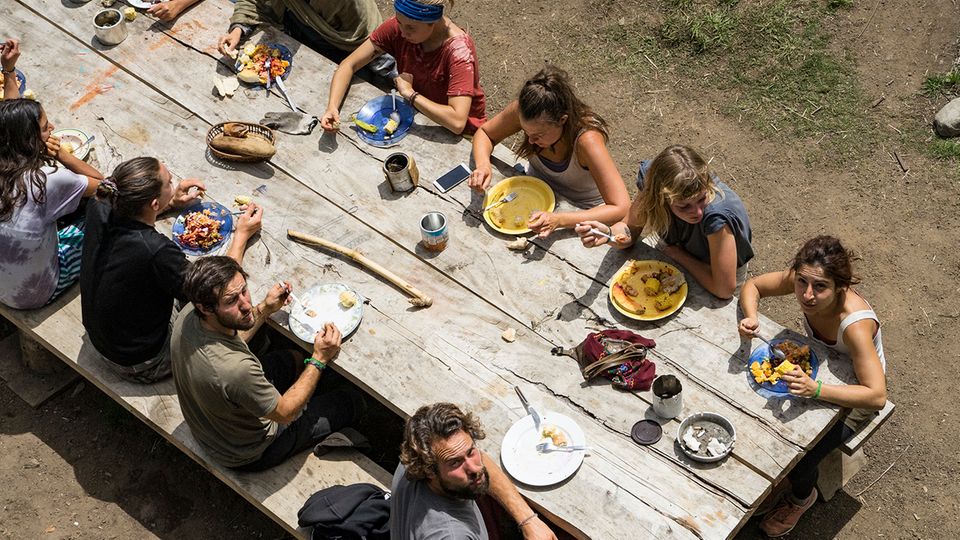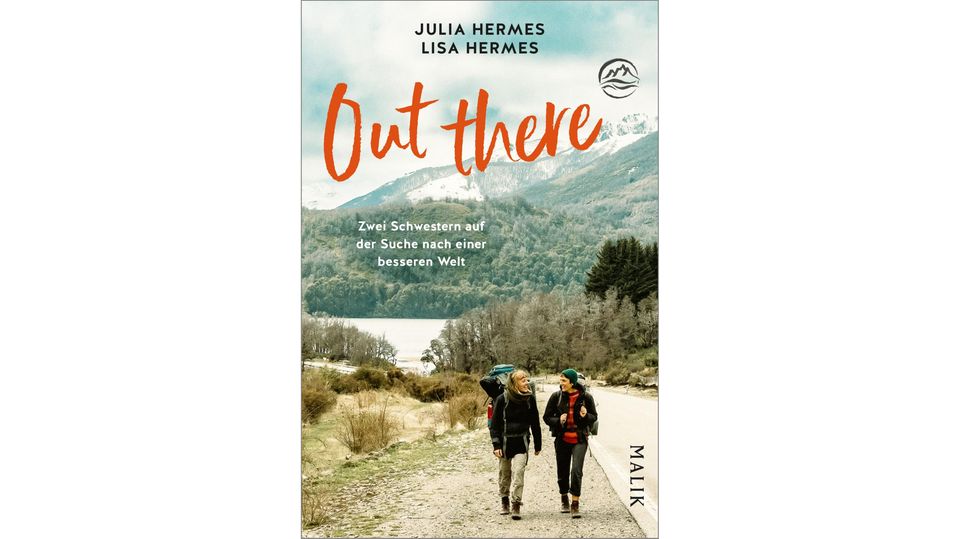Lisa and Julia Hermes long for a world that is more sustainable and solidarity-based than ours. So, without further ado, they start looking for lived utopias. Their journey takes them through Europe across the Atlantic to the deepest rainforest in Latin America – and somehow also to themselves.
It all started with an old globe that the two sisters Lisa and Julia Hermes discovered in their parents’ attic. He gives them the crazy idea of a different kind of trip around the world. Two years later, the two find themselves in the back seat of a ride. They only have the bare essentials in their backpacks, but they have a lot of questions with them: How can we interact peacefully with one another? What alternatives to capitalism are there? And how do we treat nature with respect? After saving for months, they are now setting off on their adventure together – not as holidaymakers, but as seekers. On the trail of a better world.
Your goal? Always follow your own intuition, like the sisters in conversation with star tell us: “Apart from our first stop, we just let ourselves go and decided in exchange with different communities where we should go next,” says Lisa Hermes. After leaving their home village of Hambuch in Rhineland-Palatinate, the 33-year-old and her 32-year-old sister go straight to France, more precisely to the Zone-A-Defendre (ZAD) in Notre Dame in the northwest of the country. Translated, the name means something like “the area to be defended”. This is the name given to regions across Europe that are occupied by activists to protect the environment from destruction.
Protest in Bullerbü, France
In the 1,700 hectare area in the rural Pays de la Loire in France, several hundred people now live in a kind of commune. The association of citizens’ initiatives, farmers, autonomous people and dropouts has been campaigning against the planned construction of an airport in the region since the 1970s. However, it is not the protest that interests the Hermes sisters. Rather, it is the way the occupiers live together that fascinates Lisa and Julia. Anyone who crosses the barricades made of stacked car tires enters a kind of French Bullerbü where the residents have created a life according to their own rules.
In the middle of nature, the activists have built huts in which they live together, they look after their fields and animal husbandry themselves and have established a solidarity in which neither origin nor the past plays a role. It is a life that most people in this country can hardly imagine. And for Julia and Lisa it is just the first of many impressions on their trip that will stay with them. France would only be the beginning of their adventure.
On their journey, Lisa and Julia meet a number of people who lead lives that follow different rules than theirs. However, the municipalities and communities usually receive the two sisters kindly – and show them the world they live in
© Julia & Lisa Hermes
Next stop: The Spanish town of Benabarre in the southern Pyrenees. After it was abandoned in the 1960s, a few people built a commune here and revived the medieval town. From there we continue by hitchhiking sailing via Las Palmas to Latin America. After recovering from seasickness, Julia and Lisa visit the “Rainbow Family of Living Light” in Colombia, the Argentine hippie paradise of El Bolson and Ushuaia, the “city at the end of the world”, as the sisters will later describe the place at the furthest tip of Argentina.
Julia and Lisa spend a lot of time getting from A to B. They hitchhike, join other people’s sailing boats, hike and cycle through South America. This is not always without danger, fear is a companion in some ways, as Julia explains: “In some moments we were certainly afraid – or let’s say, we were very aware of the danger.” For example, when a group of men came to their tent at night in the Amazon. Or when she ended up hitchhiking alone with a man in the middle of nowhere and he suddenly started making lewd comments.
Against the fear of the unknown
But these situations taught her to deal with fear better. And yet most of the experiences during the four years of searching for a better world were one thing above all for the two of them: enriching. In the flashback, both rave about the many moving encounters with a wide variety of people. People who gave them a lift in the car, let them stay overnight or invited them to dinner – out of pure hospitality. “It was these small gestures that had a big impact on us. We learned that the world is not as negative as the media likes to suggest,” sums up Julia.
She is certain: “There is often so much fear fueled by the unknown, but the unknown can be enormously enriching if you are open to the beauty in the world.” The Hermes sisters therefore traveled with open eyes and hearts and embraced the new experiences. This was the only way they could hear the trees whispering in Aluantu, a small community in the middle of the rainforest in Chile. Experience up close the schools of fish in the Atlantic, the armadillos of the Patagonian Steppe and the howler monkeys in the Amazon rainforest.
And learn from the Zapatistas in Mexico what true independence means. The autonomous community lives in the mountains of Chiapas, a Mexican state. Among the indigenous peoples, the region is better known as the “Valley of the Forgotten”. Since the Mexican Revolution in 1910, the autonomous groups there have been campaigning for the rights and independence of the indigenous population. Reason enough for Julia and Lisa to join them for a while.
“The Zapatistas organize themselves in small villages in a grassroots democratic way and live in strong harmony with nature. “That could be an approach that could be implemented in a similar way in many regions of the world,” says Julia. For her, the time in Mexico was particularly inspiring. Lisa, on the other hand, reconsidered her attitude towards money during the trip: “Up until our trip I always automatically associated money with consumption, competition and capitalism; for me it has always also meant exploitation and greed for power. There are already models of a solidarity economy in the world.”
The search for a better world
And these are just two of the many memories from four years that both sisters take back to Germany with them. When they return home, it is initially difficult for both of them to return to their old structures. Lisa cannot part with Mexico and decides to live half there and half in Germany, while Julia visits other communities in Europe with her dog Nami. “Our dream is to found a community ourselves or at least live self-sufficiently in the country,” says the 33-year-old.
Lisa and Julia Hermes, “Outthere. Two sisters in search of a better world”, published in July 2023 by Malik Verlag, available for 18 euros.
© Malik Publishing
The search for a better world at Hermes is far from over. And yet the two have already come a little closer to their goal: “What we definitely discovered on our journey is that a better world is not a utopia. We met so many people who are already working on solutions to the existing problems of our time,” says Lisa. And Julia already has an idea of what this “better world” could look like: “I would like to live in a world in which all living beings can live freely and self-determinedly.” We’re still a long way from that – but who knows where the ancient globe will send the Hermes sisters next time.



